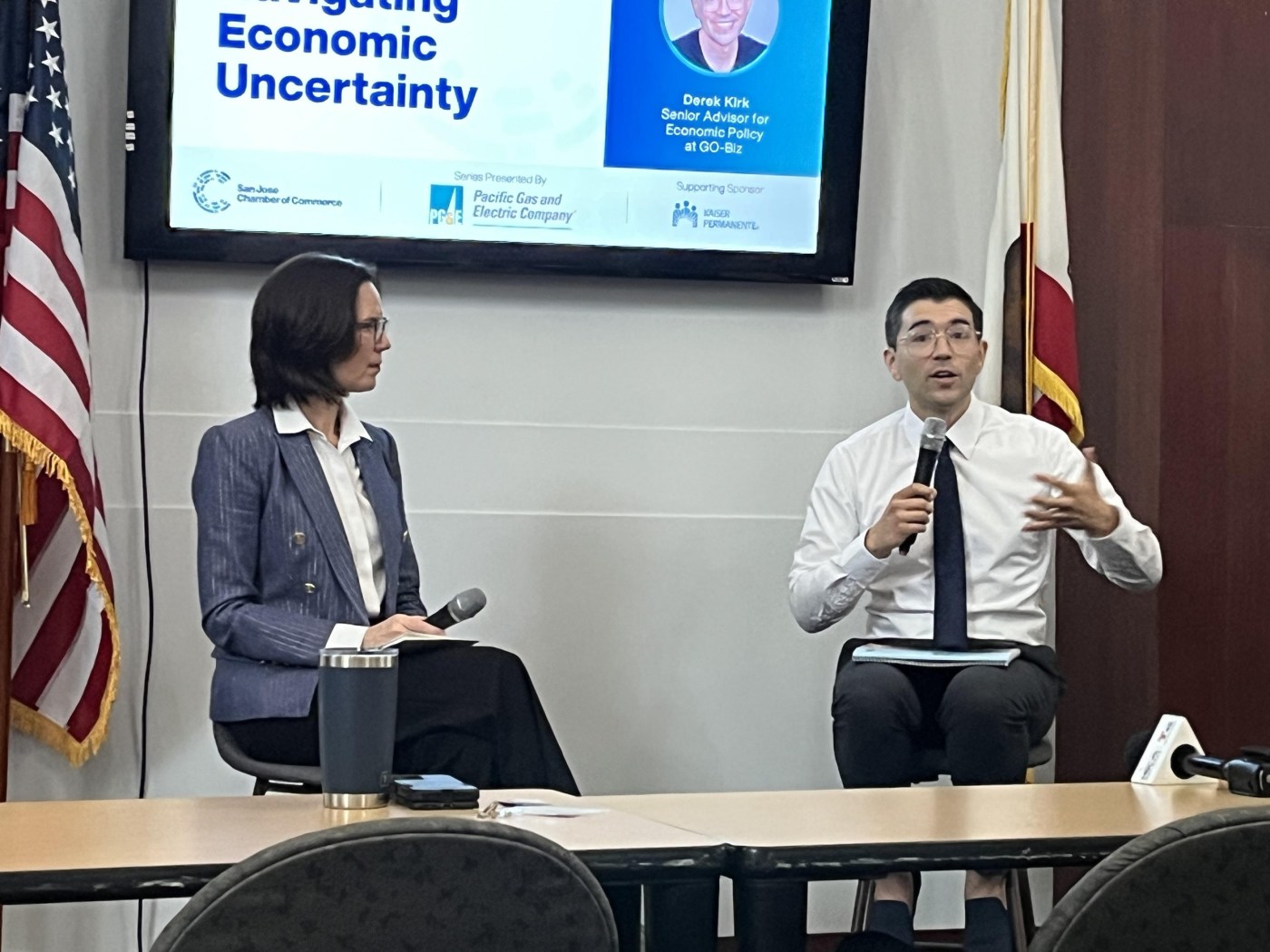
SAN JOSE — A California government economics expert has offered San Jose business leaders assurances they can navigate tariffs and other financial turbulence — and also sketched a view of a robust economy despite the state’s feeble job market.
Derek Kirk, a top advisor with the California Governor’s Office of Business and Economic Development, a.k.a. GO-Biz, appeared Tuesday at a San Jose Chamber of Commerce Power Breakfast, one of a series of events featuring influential figures who are important to the business community. PG&E is presenting the series of events.
Kirk also touted California’s status as the world’s 4th-largest economy — even though California has one of the nation’s weakest job markets in a comparison of the nation’s 50 states and has lost tens of thousands of jobs so far in 2025.
The tension between the administrations of Gov. Gavin Newsom and President Donald Trump was an elephant in the room.
“There’s a lot of rhetoric coming out of D.C. right now,” said Kirk, referring to the Washington, D.C.-based administration headed up by the president. “But there also are some occasional bright spots of collaboration with our federal partners.”
About a month or two ago, the Trump administration certified all 13 regional plans for economic development in California, according to Kirk.
The certification bolsters California’s efforts to develop economic development plans for every part of California.
California’s quest to custom-tailor economic development efforts for 13 regions statewide is part of Gov. Newsom’s $245 million program to spur job growth in the state.
During an interview prior to the presentation, Kirk stated that California government officials are focused on helping small and large businesses prosper in the state.
“We are focused on ensuring that we can help businesses move at the speed of industry, which isn’t always the easiest thing to do in California,” Kirk said in an interview.
These efforts include a push to improve the administration of the developer-dreaded California Environmental Quality Act.
“The governor has done a lot the last couple of years to speed up permits, to streamline CEQA, and to ensure that businesses are able to move and develop and create jobs,” Kirk said.
More than a few critics believe CEQA has hobbled homebuilding and development projects in California.
“We hear a lot about how California’s regulatory regime is too intense, too prohibitive,” Kirk said.
Generalized business and industry complaints don’t offer sufficient guidance, in Kirk’s view.
“Let’s get specific,” Kirk said. “What are the exact permits, what are the exact issues that businesses are facing. Let’s start tackling those and taking one bite of the apple at a time.”
Gov. Newsom has signed more than 50 bills to streamline the CEQA process, Kirk stated.
Tariffs are having an impact on some small businesses in the Bay Area’s largest city, according to San Jose Chamber of Commerce President Leah Toeniskoetter.
Toeniskoetter said she has heard from some merchants in San Jose’s lively Japantown district that tariffs and rising costs for imported items have squeezed their ability to import low-cost products.
“In Japantown, small vendors who are importing their goods to sell here at retail said their biggest challenge is now their costs have gone up,” Toeniskoetter said. “They are raising prices. From what we’ve heard from our small businesses, they have to raise prices. They cannot absorb the cost.”
Despite the rosy depiction of California’s economy, the state’s job market appears to be frail at present.
To be sure, California managed to gain 17,700 jobs in April, according to the most recently available jobs report released by the state Employment Development Department.
Yet that one-month upswing wasn’t enough to overcome the brutal job market so far this year, an analysis of the state EDD figures show.
Including the gains in April, over the first four months of 2025, the state lost 32,300 jobs, the EDD reports show.
During the January-through-March first quarter of the year, California’s job performance was so weak that it was ranked No. 48 among the 50 states. Only Alaska, Nevada and Montana had weaker job performances over those three months.
“California’s economy is incredibly diverse,” Kirk said when asked to comment about the state’s low ranking in comparison to its peers.
When asked in a follow-up question about the job market specifically, Kirk replied, “California’s economy is incredibly unique. We continue to work with businesses to ensure that we are supporting their job creation efforts, and equally important to ensure that Californians have access to those jobs.”